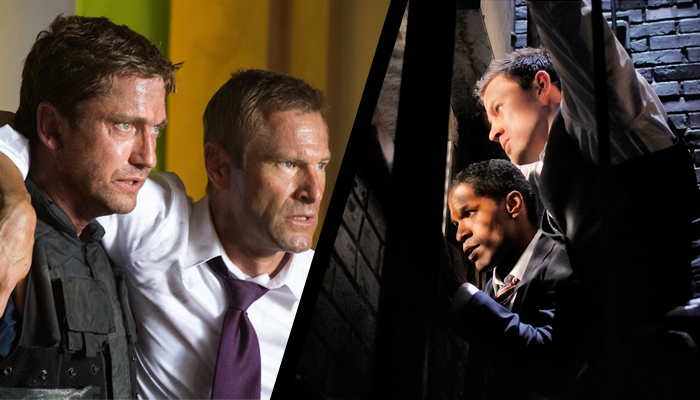Why yes there is room for you Deep Impact (1998), why thank you Armageddon (1998). It’s happened before and it continues to happen even now, when two similarly-themed films release within the same calendar year. Deep Impact came out on May 8, 1998 at a budget of approximately $80 million and went on to gross roughly $350 million worldwide. It was the more humanistic story versus the ‘then’ more star-studded glamour of Armageddon. A film costing approximately $140 million, but went onto gross roughly $554 million worldwide.
Does Hollywood even care? Probably (and) not. It saturates the market in the same way comic-book themed films are now the dominating source of income. But it’s definitely curious when two films of the exact same premise (albeit a couple-to-few differences) release so close to one another. As such that brings us to the films Olympus Has Fallen (2013) which released earlier this year in March and the recent late June release of White House Down (2013).
I know what you’re thinking, why are we waiting so long to review either of these films. Well it’s simple, this ‘versus’ article is something we could not pass up (or maybe it’s just me). So here we go, Olympus Has Fallen versus White House Down, the particulars and non-particulars with spoilers included.
Premise vs. Premise
 Olympus Has Fallen – When the White House (Secret Service codename: “Olympus”) is captured by terrorists, disgraced former Presidential guard Mike Banning (Gerald Butler) seemingly finds himself trapped inside, in the wake of the attack. Using his inside knowledge, Banning works with national security in an effort to rescue the President (Aaron Eckhart) from his kidnappers and avert an even bigger disaster.
Olympus Has Fallen – When the White House (Secret Service codename: “Olympus”) is captured by terrorists, disgraced former Presidential guard Mike Banning (Gerald Butler) seemingly finds himself trapped inside, in the wake of the attack. Using his inside knowledge, Banning works with national security in an effort to rescue the President (Aaron Eckhart) from his kidnappers and avert an even bigger disaster.
 White House Down – Capitol Policeman John Cale (Channing Tatum) has just been denied his dream job with the Secret Service of protecting President James Sawyer (Jamie Foxx). Not wanting to let down his little girl with the news, he takes her on a tour of the White House, when the complex is suddenly overtaken by a heavily armed paramilitary group. Now, with the nation’s government falling into chaos and time running out, it’s up to Cale to save the President, his daughter, and the country.
White House Down – Capitol Policeman John Cale (Channing Tatum) has just been denied his dream job with the Secret Service of protecting President James Sawyer (Jamie Foxx). Not wanting to let down his little girl with the news, he takes her on a tour of the White House, when the complex is suddenly overtaken by a heavily armed paramilitary group. Now, with the nation’s government falling into chaos and time running out, it’s up to Cale to save the President, his daughter, and the country.
TMB Thoughts – In both films, you guessed it – the White House is taken down! The real joy of both films however is watching the improbability of the same situation occurring and succeeding twice. Both films allow for the leading character(s) (Butler, Tatum) to have a road to redemption (proving their worth) and the President in each filmed is played by another actor well-known enough (Eckhart, Foxx). Beyond that it’s a tale of heroics, and since Channing Tatum has a daughter in his film, we need to give the edge to White House Down here. What stakes are bigger when you have to save both the President and your own daughter?! (Actually there is a little more to what Gerard has to do, but we’ll get to that later.)
Actors/Characters vs. Actors/Characters
 Olympus Has Fallen – Gerald Butler plays the leading role of Mike Banning (Secret Service Agent) and Aaron Eckhart plays President Benjamin Asher (he’s the President, it doesn’t get any higher). The rest of the supporting cast is rounded out by Morgan Freeman (Speaker of the House, Allan Trumbull), Angela Bassett (Director of the Secret Service, Lynne Jacobs), Rick Yune (lead villain, North Korean terrorist Kang Yeonsak), Dylan McDermott (inside man aka traitor, Dave Forbes), Finley Jacobsen (necessary child actor, President’s son Connor Asher), Melissa Leo (Secretary of Defense, Ruth McMillan), Radha Mitchell (Mike Banning’s wife and nurse, Leah Banning), Robert Forster (overzealous military strike first won’t listen to anyone else Army Chief of Staff, General Edward Clegg), Cole Hauser (Agent Roma, now Head Service Service Agent for the Presidential Detail, since Banning got demoted), Ashley Judd (First Lady of the United States, Margaret Asher who dies early in the film under Banning’s watch hence the disgrace), and many more.
Olympus Has Fallen – Gerald Butler plays the leading role of Mike Banning (Secret Service Agent) and Aaron Eckhart plays President Benjamin Asher (he’s the President, it doesn’t get any higher). The rest of the supporting cast is rounded out by Morgan Freeman (Speaker of the House, Allan Trumbull), Angela Bassett (Director of the Secret Service, Lynne Jacobs), Rick Yune (lead villain, North Korean terrorist Kang Yeonsak), Dylan McDermott (inside man aka traitor, Dave Forbes), Finley Jacobsen (necessary child actor, President’s son Connor Asher), Melissa Leo (Secretary of Defense, Ruth McMillan), Radha Mitchell (Mike Banning’s wife and nurse, Leah Banning), Robert Forster (overzealous military strike first won’t listen to anyone else Army Chief of Staff, General Edward Clegg), Cole Hauser (Agent Roma, now Head Service Service Agent for the Presidential Detail, since Banning got demoted), Ashley Judd (First Lady of the United States, Margaret Asher who dies early in the film under Banning’s watch hence the disgrace), and many more.
 White House Down – Channing Tatum plays the lead role of John Cale (US Capitol Police Officer aspiring to be what Gerard Butler already is, a Secret Service Agent) and Jamie Foxx plays President James Sawyer (again, he’s the President, it doesn’t get any higher). The supporting cast is rounded out by Maggie Gyllenhaal (Secret Service Agent, soon to be head of the Presidential Detail, Carol Finnerty, when), James Woods (as Martin Walker, Head of the Presidential Detail turns traitor), Jason Clarke (as Emil Stenz, a disavowed ex-Delta Force operative and leader of the mercenaries), Richard Jenkins (Speaker of the House, Eli Raphelson, also the real inside man aka traitor, oh my god what a twist!), Joey King (who played young Talia al Ghul in 2012’s The Dark Knight Rises, now as Emily Cale, necessary child actor and super patriotic daughter of Channing Tatum’s character), Jimmi Simpson (as Skip Tyler, a notorious computer hacker working for the mercenaries), Nicolas Wright (Donnie, the White House tour guide aka more comic relief), Michael Murphy (Vice President, Alvin Hammond, one part overzealous strike first character), Peter Jacobson (Vice President’s aide, Wallace, second part overzealous strike first character), Garcelle Beauvais (First Lady, Alison Sawyer), Rachelle Lefevre (Melanie, the ex-wife of Channing Tatum’s character), Lance Reddick (you know him from Fringe, good casting because he pulls off his role as General Caulfield well), and many more.
White House Down – Channing Tatum plays the lead role of John Cale (US Capitol Police Officer aspiring to be what Gerard Butler already is, a Secret Service Agent) and Jamie Foxx plays President James Sawyer (again, he’s the President, it doesn’t get any higher). The supporting cast is rounded out by Maggie Gyllenhaal (Secret Service Agent, soon to be head of the Presidential Detail, Carol Finnerty, when), James Woods (as Martin Walker, Head of the Presidential Detail turns traitor), Jason Clarke (as Emil Stenz, a disavowed ex-Delta Force operative and leader of the mercenaries), Richard Jenkins (Speaker of the House, Eli Raphelson, also the real inside man aka traitor, oh my god what a twist!), Joey King (who played young Talia al Ghul in 2012’s The Dark Knight Rises, now as Emily Cale, necessary child actor and super patriotic daughter of Channing Tatum’s character), Jimmi Simpson (as Skip Tyler, a notorious computer hacker working for the mercenaries), Nicolas Wright (Donnie, the White House tour guide aka more comic relief), Michael Murphy (Vice President, Alvin Hammond, one part overzealous strike first character), Peter Jacobson (Vice President’s aide, Wallace, second part overzealous strike first character), Garcelle Beauvais (First Lady, Alison Sawyer), Rachelle Lefevre (Melanie, the ex-wife of Channing Tatum’s character), Lance Reddick (you know him from Fringe, good casting because he pulls off his role as General Caulfield well), and many more.
TMB Thoughts – It really is a toss-up at this point, for myself my recent memory of Butler has been his slew of romantic comedy roles and that time he played King Leonidas in 300 (2007). Channing Tatum on the other hand is Channing Tatum, he’s become more self-aware of his roles and honestly for myself, I don’t really mind him. So whether you can take the guy in doses or not at all, that’ll be your turn-off or tune-in, in respect to watching White House Down given he has the leading role.
The Presidential roles are a toss-up as well. I think it was more about finding actors who could balance one another given both Butler/Tatum’s castings for their respective movies. The more curious thing is that Aaron Eckhart plays a President who is more rugged/hands-on physically, versus Jamie Foxx plays a President who hasn’t served a single day of military service. As such his role of having to be hands-on becomes more of a comedic relief versus the aggressiveness Eckhart is allowed to display. It’s an equal sense of humanity and the key thing is to get someone adequate for the role.
The supporting cast for Olympus Has Fallen is a lot simpler versus there are a lot more familiar faces found in White House Down. But frankly it’s all mitigated by the character of Emily Cale, whose role in the film I found to be unbelievably obnoxious. It’s not a slight at Joey King, it’s more so what the writing called for her to do (but, again, we’ll get to that a little later). In the end I give the edge to Olympus Has Fallen, as I found the actors in that film to be more seasoned and appropriate given the film’s tone and requirements. White House Down was missing aggressiveness throughout with all its characters, which added fuel to the illogical nature of the movie. But I’m really arguing semantics here – they’re still the same movie.
Villians/Motives vs. Villains/Motives
 Olympus Has Fallen – The White House is taken down by North Korean terrorists, whose goal is to remove the US troops from the Korean Penisula to allow the civil war to end between North and South. Kang Yeonsak (played by Rick Yune) believes without the interference from America, Korea will be motivated through his own hope for a reunification of Korea as a whole. He’s also motivated by the vengeance for the death of his parents (mother is killed by an American landmine and father is execusted for crimes against North Korea) and seeks the access codes to the system called Cerberus, which allows remote access to all the nuclear warheads across the United States. His added incentive is to self-detonate the nuclear warheads in their silos leaving America an irradiated wasteland.
Olympus Has Fallen – The White House is taken down by North Korean terrorists, whose goal is to remove the US troops from the Korean Penisula to allow the civil war to end between North and South. Kang Yeonsak (played by Rick Yune) believes without the interference from America, Korea will be motivated through his own hope for a reunification of Korea as a whole. He’s also motivated by the vengeance for the death of his parents (mother is killed by an American landmine and father is execusted for crimes against North Korea) and seeks the access codes to the system called Cerberus, which allows remote access to all the nuclear warheads across the United States. His added incentive is to self-detonate the nuclear warheads in their silos leaving America an irradiated wasteland.
 White House Down – The White House is taken down by domestic terrorists, lead by Martin Walker, Head of the Presidential Detail and Secret Service Agent (played by James Woods). He’s motivated by the death of his son due to a botched black ops mission and views this as a suicide mission due to him being diagnosed with an inoperable tumor as well (if you have to die, why not be for revenge, right? I guess?). At the beginning of the film, President James Sawyer (Jamie Foxx) has announced a proposed peace treaty between all allied countries in the removal of military forces from the Middle East. Walker’s goal is that of a $400 million dollar ransom with the hostages taken by the hired mercenaries as well as using the President’s biometrics to activate the nuclear football from which he plans to use all of America’s nuclear warheads to completely nuke all of Iran. The added twist is that the real mastermind of the film is Speaker of the House, Eli Raphelson (played by Richard Jenkins) as through a series of events he’s sworn in as the President of the United States. Once sworn in he pages Walker the nuclear launch codes to fulfill their plan, put the troops back in Iran, and remain President forever-ever (because sometimes one “ever” isn’t enough). (Just in case you missed it, yes both James Woods’ and Richard Jenkins’ characters both still use pagers in the film.) Raphelson’s motivations are based on the military contract companies he’s (secretly/not secretly) associated with who supply both sides with weapons and President Sawyer’s proposed peace plan would hurt the obvious monetary gain through war.
White House Down – The White House is taken down by domestic terrorists, lead by Martin Walker, Head of the Presidential Detail and Secret Service Agent (played by James Woods). He’s motivated by the death of his son due to a botched black ops mission and views this as a suicide mission due to him being diagnosed with an inoperable tumor as well (if you have to die, why not be for revenge, right? I guess?). At the beginning of the film, President James Sawyer (Jamie Foxx) has announced a proposed peace treaty between all allied countries in the removal of military forces from the Middle East. Walker’s goal is that of a $400 million dollar ransom with the hostages taken by the hired mercenaries as well as using the President’s biometrics to activate the nuclear football from which he plans to use all of America’s nuclear warheads to completely nuke all of Iran. The added twist is that the real mastermind of the film is Speaker of the House, Eli Raphelson (played by Richard Jenkins) as through a series of events he’s sworn in as the President of the United States. Once sworn in he pages Walker the nuclear launch codes to fulfill their plan, put the troops back in Iran, and remain President forever-ever (because sometimes one “ever” isn’t enough). (Just in case you missed it, yes both James Woods’ and Richard Jenkins’ characters both still use pagers in the film.) Raphelson’s motivations are based on the military contract companies he’s (secretly/not secretly) associated with who supply both sides with weapons and President Sawyer’s proposed peace plan would hurt the obvious monetary gain through war.
TMB Thoughts – White House Down undoubtedly throws a twist in its movie which makes you wonder why the runtime for the film is 137 minutes. When it’s revealed you soon realize why it’s longer than two hours. The extra 17 minutes really isn’t an edge over Olympus Has Fallen, as its 120 minutes paces out the motives across the storyline, simply and in a direct manner (actually it has a slight twist of its own [see: faked deaths!]). Both films are ‘current’ in their depiction of what could/would/should is/are internal or external threats to the United States government. (Much like the Red Dawn (2012) remake cast it’s villains as North Koreans to maintain a sense of relevancy to the current times.) Overall if finding an opposing force was needed to take down the White House, these films tie here in both of their attempts.
Title/Tagline vs. Title/Tagline
Olympus Has Fallen – “When our flag falls our nation will rise.”
White House Down – “It will start like any other day.”
TMB Thoughts – It’s always fun to see when or if in fact the title of the film is reiterated in the movie itself. And with both of these films it’s absolutely a need to be said dramatically. When it comes to Olympus Has Fallen versus White House Down, Olympus Has Fallen wins hands-down, as Cole Hauser crawls desperately in his attempt to save the White House but deems it is too late and says before his death “Olympus has fallen… I repeat Olympus Has… Fallen (bang-bang-dead)” White House Down says its title over radio chatter as director Roland Emmerich chooses the line “white house down” as he pans towards White House itself now under mercenary rule.
The taglines are ironic in that they should actually be reversed. There is more civilian patriotism in White House Down, that the slogan of a nation rising up suits its film more so. Not that having hundreds if not thousands of civilians watching the White House outside of its gates makes any sense. You know, instead of the military/army quarantining an X amount of mile radius where they can operate safely. (I’m just saying, they should’ve all been evacuated.) Olympus Has Fallen on the other actually starts like any other day and in a year when A Good Day to Die Hard (2013), the fifth installment to the Die Hard franchise came out. Olympus Has Fallen is actually the Die Hard 5 we should’ve received. As such the idea of “any other day” fits the everyday man normally played by John McClane, but instead is played by Mike Banning. We won’t get a franchise out of his character, but in this case of Olympus Has Fallen versus White House Down. Olympus Has Fallen wins out in the Title category, but both miss in the Tagline category. (Come on you two! You should’ve just traded taglines! You released within months of one another!) Regardless the edge goes to Olympus Has Fallen.
Director vs. Director
Olympus Has Fallen – Directed by Antoine Fuqua who is known for The Replacement Killers (1998), Training Day (2001), Tears of the Sun (2003), King Arthur (2004), Shooter (2007), and Brooklyn’s Finest (2010).
White House Down – Directed by Roland Emmerich who’s filmography includes Universal Soldier (1992), Stargate (1994), Independence Day (1996), Godzilla (1998), The Patriot (2000), The Day After Tomorrow (2004), 10,000 BC (2008), and 2012 (2009).
TMB Thoughts – Fuqua’s direction for action has always had a penchant for close-up grittiness and as a result there tends to be a more realistic tone of violence for his films. Olympus Has Fallen isn’t any different and its R-rating is depictive of Fuqua’s style. It’s a welcomed malice if ever such a thing was required as it gives an opportunity for Fuqua not to shy away especially when Gerard Bulter is going through the White House taking enemies out one by one.
Emmerich’s direction is what you would expect given his history of disaster films both praised and lauded by critics and fans. He does a solid job of depicting the necessary action with energetic shots and scenes with various effects. White House Down has a bigger budget, it shows, and it is something Emmerich is accustomed to. He keeps the pace simple enough and camera angles both stylistically close and wide, that it’s almost a refinement of his craft. But in the same stead, it is what you expect. Conversely to Olympus Has Fallen, White House Down carries a PG-13 rating.
In case of directing, while Emmerich’s resume of films probably lists as ‘films you’ll more commonly watch on reruns on television’. Fuqua’s style worked better for me in regards to a ‘villains have taken over the White House’ film. The grittiness and allowance of the R-rating added a gratuitous nature of violence, given what was happening. Taking down the White House in either film is done with violence and it’s not to say White House Down shys away from it. If the illogical concept of both films has to take place, why not just not hold back to begin with. Sometimes with the comedic overtones, White House Down felt like a parody of itself or better yet, Olympus Has Fallen. (I don’t even know if that’s possible, or if it’s a good thing.) In terms of directing for Olympus Has Fallen versus White House Down, I give the ever so slight edge to Olympus Has Fallen.
Unnecessary/Required Child Actor vs. Unnecessary/Required Child Actor
Olympus Has Fallen – Finley Jacobsen as Connor Asher, the President’s son.
White House Down – Joey King as Emily Cale, the daughter of Channing Tatum’s character.
TMB Thoughts – Maybe I’m being too harsh and maybe it’s my own pet peeve (it is), but I can’t handle dumb kids in films. As in, children who constantly make dumb decisions in a movie. It hurts a films’ progression and also takes away from the enjoyment overall. I couldn’t count the amount of times where the focus of Joey King’s character Emily Cale, made things absolutely cringe-worthy.
I’m going out of a limb to accept the fact that Emily goes around videographing all of the mercenaries throughout the White House, which as a result of her uploading said videos to YouTube allows the United States government to visually identify all the assailants. I mean never mind the fact that the White House should have its own video surveillance installed. But her uploading the videos to YouTube under her username/real name, reminds me of when Richard Thornburg (William Atherton) in Die Hard (1988) exposes the link of John McClane to why he is in the Nakatomi building. (It’s going to cause problems later guys!!) In Die Hard I accepted it, in White House Down it feels like a poorly conceived plot device. Nevermind the fact that Emily as a character is stubborn in the worst way possible and doesn’t stay put and eventually becomes more pro-active in bad ways. But when given the opportunity to be pro-active in good ways (near the end of the film when she’s the only opposing good force with the President in the Oval Office along with villain James Woods), she refuses to do anything (this little girl ain’t helpless!! I saw you video mercenaries earlier in the film!!).
The film already has me in disbelief, but to just watch her character cry in the corner and do nothing made me want to yell at her (I did what I could in the theatre and raised my arms up in exacerbation). I mean the nuclear football was right there, hell even Arnold’s daughter in True Lies (1994) stole the nuclear launch key. These types of bad plot sequences were worked out 19 years ago. It made even worse sense given how the film portrayed how exceeding patriotic Emily’s character was. And even worse when she does something like wave off the air strike on the White House by taking a flag out on the lawn which is reminiscent of the Nicholas Cage in The Rock (1996) doing the exact same thing (Come on Emmerich, you know what you’re doing!!). And then is proclaimed by the reporters broadcasting the events live on television as “Emily Cale what a brave little girl!” I couldn’t handle the fact that she could’ve avoided capture too, given she was “so smart” to video all the mercenaries and upload the videos to YouTube. I’m honestly surprised she didn’t upload things to Facebook as well and tag the villains herself (probably could’ve if you took your video stash and then hid out in I don’t know somewhere where the mercenaries weren’t, also holy hell, SILENT MODE ON YOUR PHONE EXISTS!!!). The strangest thing for me about her doing it was I don’t even recall the product placement for what kind of phone she used.
My complaint is she gets in the way, but it’s a necessary tact that requires Channing Tatum’s involvement. On the opposite side, Olympus Has Fallen’s Connor Asher, just listens to Gerard Butler. Sure there is the added background that Butler’s character has semi-trained Connor for fun to be a Secret Service Agent, but it’s nice foresight to at least not have Connor’s character be you know, useless. When the going gets tough the kid listens and is smart enough to do the right thing and avoid capture. All it requires is Butler finding him first and to my surprise evacuates him from the White House to remove the leverage of the terrorist’s having the President’s son (surprise non-cliche in Olympus Has Fallen?! Unbelievable.). It moves the film right along, while still including a child actor in a necessary/required way. As a result Butler’s character can go off and exact taking out the enemies without any worries other than the President himself.
In respect to the unnecessary/required child actor category of Olympus Has Fallen versus White House Down. The obvious edge and win goes to Olympus Has Fallen.
Morgan Freeman’s Revenge
Olympus Has Fallen – Stars Morgan Freeman.
White House Down – Does not star Morgan Freeman.
TMB Thoughts – Why is this a category? Because back in 1998 Morgan Freeman was involved with the battle of which is the better asteroid crashing into Earth film. Deep Impact had a lower budget of $80 million versus the $140 million budget of Armageddon. Deep Impact would go on to gross less at the box office and this contrast is here simply because of how an audience is no longer fooled by big-budget films. Just because a studio throws more money and effects at something, doesn’t necessarily mean it will equate to a good film. Most times or maybe all along it’s just been a mask to hide the realities of a film being bad. Or in later history films are so bad they’re good.
There is less of a commitment with Olympus Has Fallen and given its shared premise with White House Down, it’s arguably the safer gamble in regards to making a movie that probably shouldn’t have been made (BUT WE GOT TWO OF THEM!!! I mean seriously think of any movie you would’ve wanted made with an overall budget of $220 million, I know that’s not how it works, but that’s the math!). It’s more of a wonder why/how White House Down even cost $150 million to make. But back in 1998 when Morgan Freeman starred in a film with a shared premise, he lost. However in the case of Olympus Has Fallen versus White House Down, it looks like the movie with him in it, wins out this time. Olympus Has Fallen has gone on to gross $161 million worldwide, as of right now White House Down has made approximately $68 million worldwide. If White House Down manages to recoup its overall budget, it’d be an amazing feat. There are just too many improbabilities with that happening though. So in the case of Morgan Freeman’s revenge, Olympus Has Fallen wins by default. (You should’ve cast Morgan Freeman White House Down, you should’ve, probably as President, oh wait Jamie Foxx, okay then as the Speaker of the House. Morgan Freeman as the secret villain all along? Kind of cool.)
Overall
I wanted to do another category of illogical scenes/implausible way(s) to take down the White House, but really an unidentified aircraft breaking the air space around Washington, D.C. (Olympus Has Fallen), hidden military convoys suddenly breaking the White House defense (Olympus Has Fallen), an entire military/army convoy watching two vehicles pursue the President in a car case on the front lawn and continue to stand down and not aide in his recovery immediately (White House Down), numerous civilians not in a safe zone just lurking outside the White House (White House Down), and really that is just the start of it all. The category would’ve ended as a tie.
I have to say I didn’t like Channing Tatum in his role in White House Down as his aloofness didn’t play well to the seriousness of the situation. So areas with his side commentary didn’t add to his believability of wanting to be apart of the Presidential Detail, a job he so desperately interviewed for. Even Jamie Foxx’s character as the President felt on the border of Chris Tucker in the Rush Hour franchise. It’s a harsh comment, but he had a lot of comedic relief throughout the film, more than one should expect. You can tell however both Foxx/Tatum played well off one another, so they worked well in respect to their casting together. (I also can’t help but feel I watched the film’s epilogue during the NBA Finals this year when the both of them would fill the commercial void playing a game of 11. But that was the marketing of the film.)
Olympus Has Fallen is overall the more watchable film, to which I’d give a score of 6 out of 10. White House Down nets 3 out of 10 from me, and if it wasn’t for After Earth (which I had somehow successfully forgot about already). White House Down would go down as the worst film I’ve seen this year. So no, White House Down, unfortunately there is no room for you this year, you’ve come too late, were oh so bad and Olympus Has Fallen was already here before you came.
Thanks for reading through this! If you’ve seen both films, we’d love for you to sound off below (love/hate, whatever, just do it)! Until next time when two similarly-themed films are released within the same calendar year.































